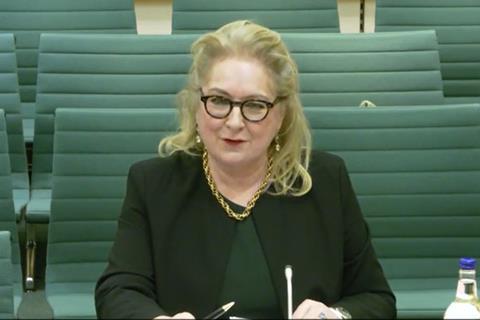The judiciary was given just 24 hours’ notice over proposed changes to the asylum system - with immigration judges given ‘little to no information’ about the future of their roles, the lady chief justice revealed yesterday.
Baroness Carr of Walton-on-the-Hill was appearing before the House of Commons justice committee yesterday. Asked by committee chair Andy Slaughter to shed light on how changes proposed by the home secretary would work, the lady chief justice said she could not: ‘The decision is obviously a policy decision. We, as ever, will stand ready to respect the will of parliament and whatever parliament decides to bring in and what changes it chooses to make. We will respect parliamentary sovereignty in the normal way.
‘As to mechanics of it, I’m not in a position to share anything about that. What I can tell you is that we were given little to no notice at all about the decision to abolish the asylum chamber.
‘That is what I understand the public announcements have stated [that the first-tier tribunal will be abolished]. We were given 24 hours’ notice of that development. I have made it extremely clear that I will do everything I can to lead and support the current judges who are sitting in that jurisdiction who have little to no information as to what their future looks like in terms of timelines and the like.
‘My understanding is that there will be a route of appeal to the upper tribunal from the independent body of adjudicators. It is very early days. Together with the senior president of tribunals Lord Justice Dingemans and I are doing everything we can to look after the immigration and asylum judges who have this news to grapple with.’

Read more
She told the committee that around 100 salaried judges and 250 fee paid judges sit in the jurisdiction.
The lady chief justice was critical of another of Shabana Mahmood’s proposals: changes to the Sentencing Council’s processes under the Sentencing Bill. Lady Carr told the committee she could not see when she would ever exercise her new power of final approval of the sentencing body’s guidelines.
She told the committee the mood in the Sentencing Council was ‘pretty bleak’ and praised 'the illustrious 15 years history' of the body and its 'remarkable work promoting consistency and transparency across the criminal justice system'.
She added: ‘Clearly the draft legislation, if implemented, has the potential to significantly undermine confidence in and the independence of the Sentencing Council.
‘My position is of course a power of veto on the part of the lady chief justice or the lord chancellor does not sit easily when we are dealing with an organisation that is independent. I cannot see realistically any situation in which I would exercise that power of veto. It is difficult to see how it will ever be of meaningful value.’
Discussing public discourse of judgments and the effect on individual judges’ security, the Lady Carr complimented accurate reporting and ‘responsible and healthy’ debate.
‘But there have been a number of occasions, whether in the media or a single occasion in parliament where things, as far as I am concerned, went badly wrong,’ she said. ‘The problem for me was the inaccurate narrative, the inaccurate premise of the debates that were taking place in a manner that caused and led to immediate security threats to my judges. If you choose to debate on a premise that is so false and sounds so remarkable that the judge’s competence, bias, integrity…is called into question then that for me is a line in the sand.’
Debate in parliament enjoying parliamentary privilege carries a 'heavy responsibility', she said. In what will be interpreted as a rebuke to the shadow justice secretary Robert Jenrick she called on MPs to 'debate fairly and accurately - get your facts right'.
She told the committee that though trust does ‘rightly’ remain high in the judiciary, ‘that cannot be taken for granted. Every issue that undermines that trust needs to be fully justified and thoroughly examined.’
This article is now closed for comment.



























4 Readers' comments